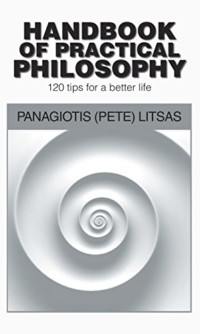Title: Handbook of Practical Philosophy: 120 Tips For A Better Life
Author: Panagiotis (Pete) Litsas
Publisher: XlibrisUS
ISBN: 978-1-9845-3511-5
Pages: 88
Genre: Self-help/Philosophy
Reviewed by: Carl Conrad
Pacific Book Review
The Handbook of Practical Philosophy by Panagiotis (Pete) Litsas provides “120 Tips For A Better Life” as it promises in the subtitle, although these “tips” are in the form of commands to either do or not do certain things. Mr. Litsas has selected certain values and behaviors that he believes will benefit most people if they practice them.
The book is divided into three parts: Part 1 in which there are 60 tips for cultivating a good relationship with yourself; Part 2 in which there are 60 tips for cultivating a good relationship with other people; and Part 3 in which guidelines for understanding life and death are described. These generalizations cover a wide range of human behaviors, and encourage an attitude and willingness to persevere through hardships, difficulties and setbacks. He also praises those qualities that bolster the personal relationships that we acquire in working with others.
The strengths of the author’s admonitions are the practical language in which he describes them and the examples or restatements of his suggestions for overcoming them. As an example, he says “Be always willing to perform your duties and obligations
without begrudging, without complaints and without resentment. Do not abandon the effort by relying on the high degree of difficulty of a case, this is also part of your life, and since you cannot avoid it, do it with a smile and keep going without nagging and complaining.”
As one can quickly see, this attitude of cooperation rather than confrontation can lead to a great improvement in one’s relationship with others and can help to gain the confidence that strengthens working – as well as personal – relationships. In many instances, he advises that we rid ourselves of these disharmonious qualities so that we can generate positive momentum that moves us toward solutions rather than disagreements.
Configured a lot like the classic work of Kahil Gabran’s, The Prophet, which suggests behaviors and values that will lead to happiness and contentment if one practices them, this book identifies many of the same commands to bring about a change of attitude that is essential to self-improvement. In short snippets of encouragement and restraint, the author peruses the many mistakes and misperceptions that lead us away from finding satisfaction in our lives, and suggests ways to correct them.
As a tool for self-growth and maturity, this book of insights and observations has a great richness in its objectives for a better life. It not only offers specific suggestions for personal growth, but describes views of life and death that will lead to a pathway of personal betterment. Handbook of Practical Philosophy is a good guide to self-improvement that can assure transformation and long-term change for greater peace.


